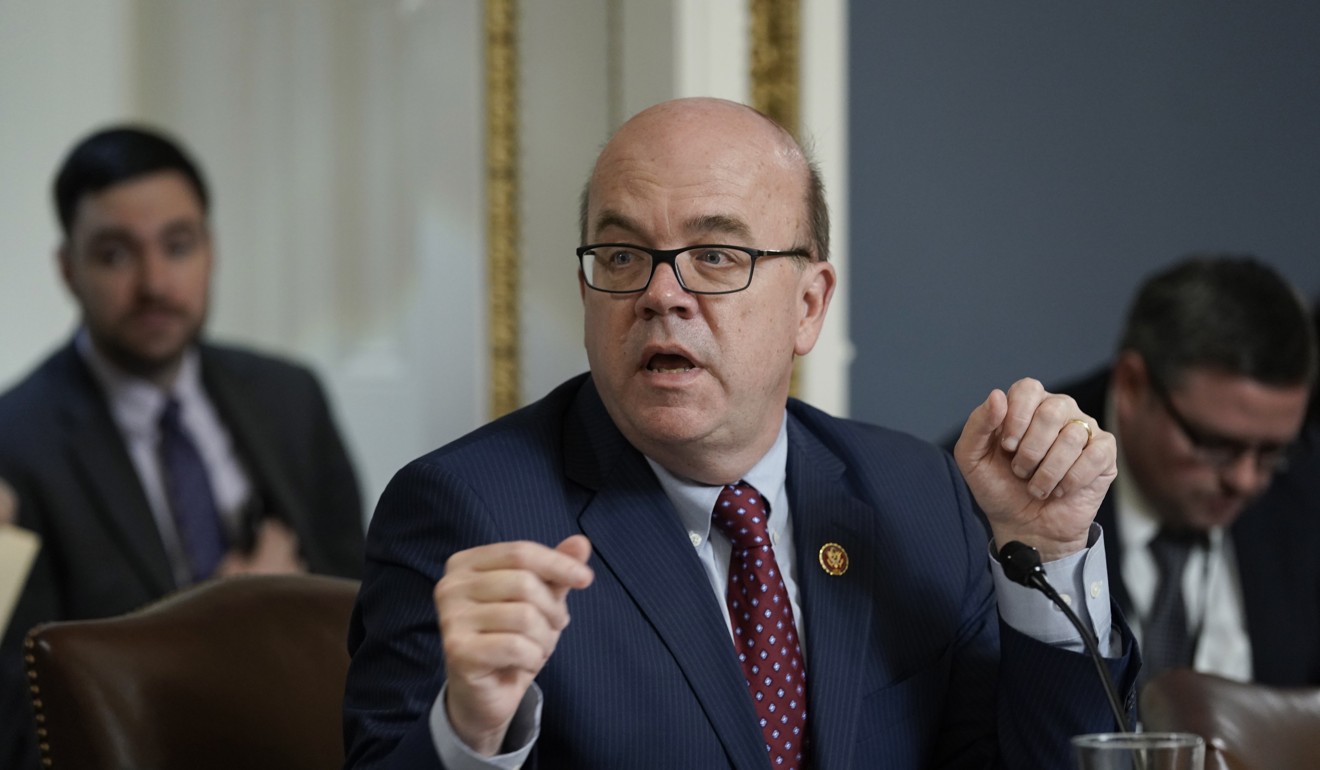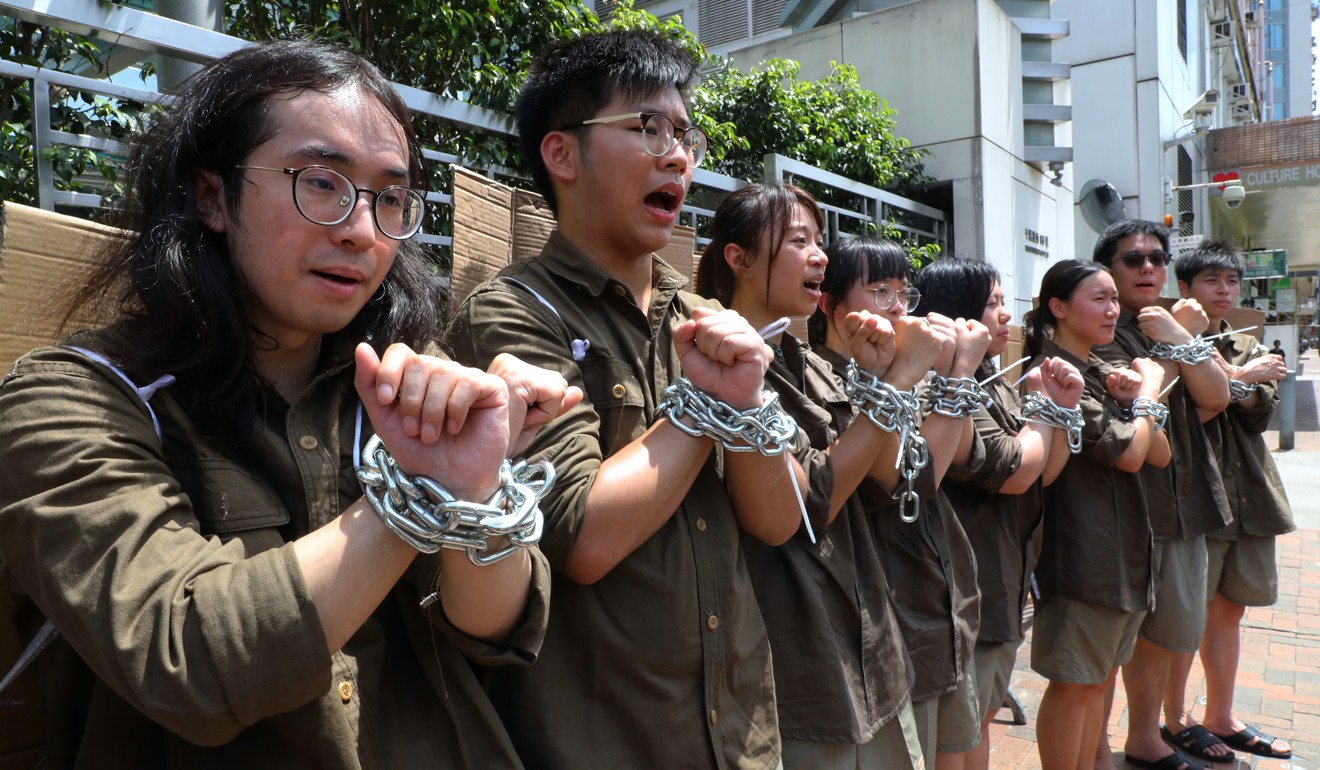
Donald Trump expresses confidence that despite massive protests over extradition bill, Hong Kong and Beijing can ‘work it out’
- But asked whether the demonstrators were sending a message to the Chinese government, the US president said: ‘I don’t know what they’re sending’
- US lawmakers from across the political spectrum expressed solidarity and support for Hongkongers who are marching to protect their rights
US President Donald Trump is sure Beijing and Hong Kong will “be able to work it out”, he said on Wednesday, after escalating protests against the city’s divisive extradition bill plunged the global financial hub into chaos.
“They’re massive demonstrations. I looked today and that really is a million people,” Trump said, referring to the city’s enormous march on Sunday opposing amendments to the bill, which would allow the city to surrender residents and visitors to mainland China to face trial.
The protest on Sunday, which organisers said drew more than a million people, was one of the largest in the city’s history, underscoring rising fear over the erosion of the autonomy and freedoms promised to Hong Kong during its handover to China from Britain in 1997.
When asked whether the demonstrators were sending a message to Beijing, Trump said: “I don’t know what they’re sending, I mean that’s a demonstration that they’re having.”
He said he understood “the reason for the demonstration”, however, adding: “I’m sure they’ll be able to work it out. I hope they’re going to be able to work it out with China.”
Trump’s comments – made at a White House meeting with Polish President Andrzej Duda – came after Hong Kong was rocked by protests against the proposed legislation, with police firing tear gas and rubber bullets at demonstrators blocking roads outside government headquarters, injuring more than 70 people.
The US State Department called on “all sides to exercise restraint and to refrain from violence”.
It is important for the Hong Kong government to respect freedom of expression and “the right of people to peacefully assemble”, State Department spokeswoman Morgan Ortagus said at a press briefing on Wednesday.
Beijing slams Nancy Pelosi for condemning Hong Kong extradition bill
The comments by Trump were the first time he has spoken publicly on the extradition bill, which has drawn condemnation from US lawmakers, officials and their European counterparts, as well as rallies in at least 29 cities around the world.
Hong Kong’s chief executive, Carrie Lam, has said her government will push ahead with the bill after the historic march on Sunday and fresh protests this week. The proposed amendments to the Fugitive Offenders Ordinance have sparked unusually broad opposition from students, pro-democracy advocates, religious groups, the legal profession and the usually pro-establishment business community.
Meanwhile, a senior White House adviser said on Wednesday that Trump might address the issue with Chinese leader Xi Jinping when they next meet at the G20 summit in Japan at the end of the month.

“We want people to live in peace and prosperity, and [it was] pretty remarkable to see that many people taking to the street,” Kellyanne Conway told reporters outside the White House.
“And when the president meets with President Xi, perhaps that will be raised,” she said, adding that the matter “certainly has caught our attention in the White House”.
The remarks followed a wave of support for the people of Hong Kong from US lawmakers. At least 18 members of Congress, Republican and Democrat, have written on Twitter that they stood in solidarity with Hongkongers, with some calling for the city’s government to withdraw the bill.
As it happened: Hong Kong police and extradition protesters renew clashes
“As the people of [Hong Kong] continue peaceful demonstrations, the Police Commissioner and Secretary for Security should direct [Hong Kong] police to refrain from using excessive force and intimidation and I urge them to protect the right to free expression,” Representative Jim McGovern, a Massachusetts Democrat, wrote on Twitter.
Later on Wednesday, a bipartisan group of 12 senators, including Mitt Romney, Jeanne Shaheen and Marco Rubio, issued a statement calling on Hong Kong authorities to respect Hongkongers’ right to protest peacefully.
“Hong Kong demonstrators know what happened in Tiananmen Square in 1989, unlike so many Chinese on the mainland,” the statement said. “They know the risk they run by defying the Chinese Communist Party. The demonstrators’ courage in the face of threats, police batons and tear gas is an example for the world to follow.”
The statement followed House Speaker Nancy Pelosi’s strongly worded condemnation of the bill on Tuesday night, when she warned that Congress “has no choice but to reassess whether Hong Kong is ‘sufficiently autonomous’ under the ‘one country, two systems’ framework” if it passes.

Under the United States-Hong Kong Policy Act of 1992, the US State Department issues an annual assessment of whether the city’s autonomy is sufficient to warrant the continuation of the special economic and trade status that it enjoys with the US as a separate entity from mainland China.
Beijing has hit back at Pelosi’s statement, calling her remarks “irresponsible and incorrect” and demanding that Washington stop interfering in Beijing’s affairs.
Amid the war of words, US lawmakers in the House and Senate are preparing to propose legislation in support of human rights in the territory.
How Hong Kong extradition law works – and proposed changes
A spokeswoman for Rubio confirmed Wednesday that the Florida Republican would reintroduce the “Hong Kong Human Rights and Democracy Act” this week.
The text would be a revised version of the 2017 bill – which included demands that the White House levy sanctions on any person responsible for the suppression of basic freedoms in the city – said the spokeswoman, confirming that the revisions would include mention of the extradition issue.
Rubio has been vocal in his support of the demonstrations and opposition to the proposed amendments, tweeting on Tuesday, “If [Hong Kong] legalizes the kidnapping of people who disagree with Beijing it will have a devastating effect on their economy.”
Last month, Rubio and McGovern were among eight US lawmakers who wrote to Lam expressing concerns about the proposed amendments and urging her to withdraw the bill. She replied on June 3, attempting to defend the changes.
“The mass protests on June 9 by over a million Hong Kong citizens alongside the opposition from the business community, judges and lawyers, and the international community clearly suggest that, at a minimum, additional time is needed to consider alternatives that would preserve Hong Kong’s reputation and commitment to the rule of law that has enabled the city to serve as a hub for commerce and the free flow of information,” they wrote.
“We are concerned that the extradition amendments may irreparably harm the future of US-Hong Kong relations.”
The letter also expressed concern that US citizens would be subjected to extradition to the mainland and possible human rights abuses under the Chinese system, echoing a State Department statement on Monday.
There are an estimated 85,000 US citizens and more than 1,300 US companies in Hong Kong – about 300 of which base their Asia regional operations in the territory – and many have voiced their concerns.
It looks like Occupy but these young Hong Kong protesters are next level
“There is a lot of anxiety among American businesses about the proposed changes and the proposed law,” said Craig Allen, president of the US-China Business Council, a trade group that represents about 220 American companies.
The extradition law “would cause great concerns to all foreign companies because, let’s be honest, many times what’s legal in Hong Kong might not be legal elsewhere in China”, he said.
The fundamental concern is whether the possibility of extradition requests from mainland Chinese authorities will weaken the rule of law in Hong Kong and the one country, two systems structure, which is seen by foreign firms as critical to their business development in the city, Allen said.
And if Hong Kong loses the special treatment status given by Washington under the 1992 policy act, US firms might not be able to export hi-tech products to Hong Kong, where they get distributed to all over Asia, as they do now, he said.
Trump made no mention on Wednesday of the risks the bill might bring to US citizens.
In refusing to take sides, he may have been following the advice he gave then-president Barack Obama during Hong Kong’s 2014 “umbrella movement”, when demonstrators took to the streets to demand universal suffrage.
“President Obama should stay out of the Hong Kong protests, we have enough problems in our own country!” Trump, then a reality TV star, tweeted in September 2014. “Can't even properly police White House.”
Additional reporting by Yujing Liu


